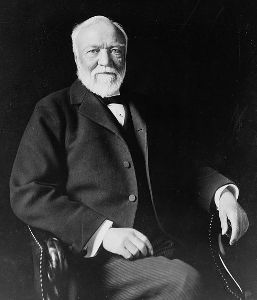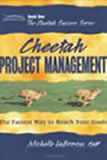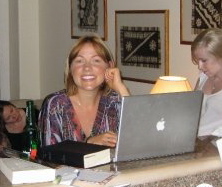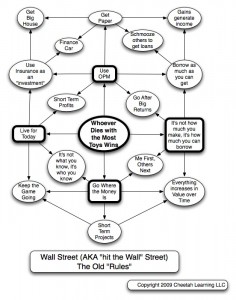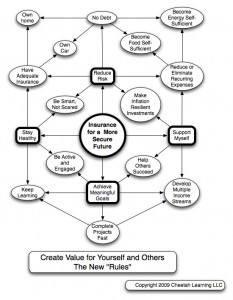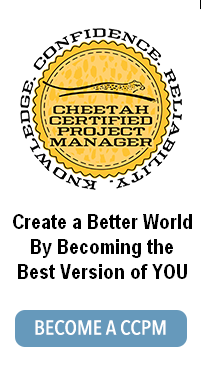Opt In, Opt Out – Watching Culture from Inside Out
Tuesday, February 24th, 2009I’ve had a number of different experiences over the past week that really got me thinking about this whole “opt in, opt out” thing popularized by the internet. It started a week ago at a dinner hosted by the farm where we rent space for our bulls. I learned more than I ever thought I needed to know about bull genetics and how to create the “super” cow. The woman running the show was a genius and I give her very high marks for creating a highly entertaining and engaging event – especially based on her audience. An audience of family farmers working the land to provide a great quality free range beef product. I still have her interactive handout in my bag where she had us do a series of math exercises based on how many head of cattle we owned vs. what we sold and what that represented with respect to impact on our customers and the environment. I got this lady, I liked her style, but still I felt like an outsider at the event. I’m not a family farmer – I’m an investment farmer and I hire other folks to manage my herd. I play by their same rules with respect to taking care of my animals – maybe even spend a bit more money to insure a humane existence because that is who I am. But I’m not the one who tends my wonderful Belgium Blue herd day to day. I opted in to the event enough to go to one event, but it was not my world and it’s unlikely I’ll go to more.
The next day I flew to the East Coast – I had to meet with my sales and marketing team to discuss – what else, opt in, opt out issues. How do we do a better job having people opt into the company and create an environment of inclusion while maintaining an element of exclusiveness because we tend to create superstars. The folks who opt in to Cheetah Learning either are looking at ensuring they maintain their superstar status or are aspiring to get to the superstar status fast. This is both helping us and it’s hurting us as folks who just don’t feel like they are super stars or aspire to something less than being their best, opt out. People have told me they know right away if they “fit” into Cheetah. The ones that don’t – they opt out pretty fast.
The meeting was great – we all enjoy getting together. But being on the East Coast is a bit of a challenge. I’m much more at home in the wilds of Alaska. And I’m also much safer. Last year, within four hours of showing up at my east coast abode, there was a very large black bear right next to my mini-van. I have never seen a bear in my yard in Alaska. This year, I was rendered house bond with just two inches of snow. In Alaska, I have neighbors galore willing to offer a helping hand when you’re stranded. Here, good luck. My front wheel drive mini-van went into anaphylactic shock over the slick road and the ABS braking system had a seizure. I finally got it into the driveway just to have it skid into a snow bank and render itself done for the day. Everyone coming into for the meeting had to take cabs and walk the quarter mile in from the road. And I got to learn just why I stock up the pantry – when something you count on “opts out” and you aren’t in a culture of “opt in” you have to have back up plans.
My blog buddy, Kristen and I rented a car and drove to Philadelphia for a wedding. We weren’t exactly sure of the details of the wedding – we know the general vicinity and had our iphones. We were able to “opt in” to a fun journey because of new technology.
My cousin was marrying into a very large and extended Filipino family. And even though we knew nothing of their customs of culture, we felt very much included in the event. We were able to “opt in” at a level that was comfortable for us.
And then I have my “internet world” that I still exist in regardless of what is happening in my external world. I have scads of folks opting in to follow me on twitter (no idea why). I think I got on several people’s follow lists who generate tons of followers so their followers are now following me. And I have a growing list of acquaintances on Facebook and linked in. Linked in is purposeful. I am trying to create an opt in network of folks that my publicist can toss publicity opportunities. Facebook is another story – while I find myself happy to “friend” someone on facebook, it just seems that a requirement to actually meet them in person is a big requirement. I’m opting in and opting out simultaneously. When is a friend is a friend is a friend? Is it possible to have “friends” that are only “friends” on the internet? It is far easier to send sentimental missives and lets keep in touch stuff via face book than it is to actually set up a time to catch up with someone you knew years ago.
Opting in or opting out – I’m not even sure most of us our conscious of our opt in and opt out practices. I opt in when the commitment is commensurate with the activity. I tend to opt out if the commitment is far in excess of what I’m willing to make to participate. Keep it light and lively and give me an easy exit strategy, and I’m more than likely to opt in, and want to keep coming back. Make me buy into a lot of stuff that just isn’t me, and I’m heading for the hills fast.


